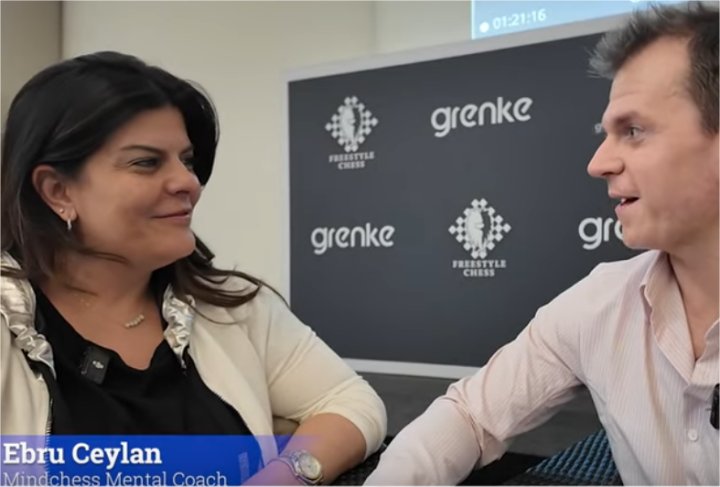


The interview was conducted in German, but below is a translation of the German transcript.
Interview with Ebru Ceylan – Mental Coach at Mindchess: "Jumping before the round is part of it"
Arne Kähler (ChessBase) Ebru, thanks for taking the time. One thing really surprised me at the Grenke Open: Christopher You is back! After everything that happened last year. Can you remind us what happened back then?
Ebru Ceylan Sure. Christopher played in the US Championship in October 2024. Toward the end of the tournament, things weren’t going well – he lost a game, was emotionally upset, and reportedly hit a camerawoman in the back on his way out of the playing hall. That’s what the camerawoman stated. Christopher recalls something, but it’s not that clear to him. As a result, he was suspended by the USCF for one year.
And then he reached out to you?
Exactly. He really wanted to keep playing, especially in Europe, because his big goal is to become a Super Grandmaster. So we started preparing him for the Grenke Open – as a sort of warm-up for the upcoming event in Sardinia.
How did he find you?
Through the Tunja Chess School. Ufuk Tunja and I work closely together. Christopher was well-prepared in terms of chess, but he wanted to get his mental game under control – and that’s where Mindchess came in.
You’re a mental coach. What exactly does that mean in practice?
I started playing chess myself in early 2024, and Ufuk was my coach. I quickly realized that knowing theory, tactics, and positions isn’t enough. Many players prepare extensively – they know their lines by heart, even half-asleep. But then at the board, nothing works. They lose focus or confidence. Mindset is a huge factor.
Just like in other competitive sports?
Exactly! In football, swimming, tennis – mental coaching is a given. In chess, it’s still a bit overlooked, but that’s slowly changing.
Since when have you been working with Christopher?
Since the beginning of this year. Not that long, but very intensively.
The first thing I noticed about him was that he was trying to jump as high as he could. Is that part of your coaching?
(Laughs) Yes, actually! I’m a trained educator, psychologist, and systemic coach. My approach is holistic. We combine different methods tailored to the individual. With Christopher, it was clear: he wanted to "rise again" – so we quite literally started jumping before and after each game.
Yesterday he was sweating heavily after the match. I thought maybe he was reliving the incident from last year…
No, that was purely physical. You caught him right after jumping – he had just done five high jumps in a row. That’s exhausting.
What are Christopher’s biggest mental challenges?
Mainly his pace. He often plays too fast – that’s one of our main focuses. Also, like many players, he’s affected by his opponent’s rating. Against stronger opponents, he often plays brilliantly. Against lower-rated ones, he sometimes becomes overconfident and makes careless mistakes.
Do you see the same issues in other players you coach?
Absolutely. I work with players of all ages and ratings – from 6 years old to adults, beginners to 2700. And the mental challenges are surprisingly similar: fear of strong opponents, or underestimating weaker ones. I’m currently coaching several young talents here at the Grenke Open as well – many in cooperation with Ufuk.
And what happens between tournaments?
The coaching continues – online. Even after Sardinia, when Christopher flies back to the US, we’ll keep working together. Before the Grenke Open, we met every two days. Normally, it’s at least once a week.
How is your relationship with his family?
Very close. His father travels with him to every tournament. Christopher is still under 18, so it’s natural we communicate a lot with his dad – sometimes even more than with Christopher himself. I use a systemic approach, which means I consider the entire environment. Especially with young talents, family pressure can be a big issue.
In what way?
Some parents are overly ambitious, which can create harmful pressure. Others don’t understand when motivation fades – especially during puberty. We try to find balanced solutions together.
One last question: For anyone listening who thinks, "This could help my child – or even myself" – how can they reach you?
Just contact me via the Mindchess website. I answer personally. The first consultation is free – and we use it to see whether we’re a good match. Trust is the foundation of everything in this work. Once that’s there, the rest comes naturally.
Thank you so much for sharing these insights, Ebru!
Thank you, Arne!